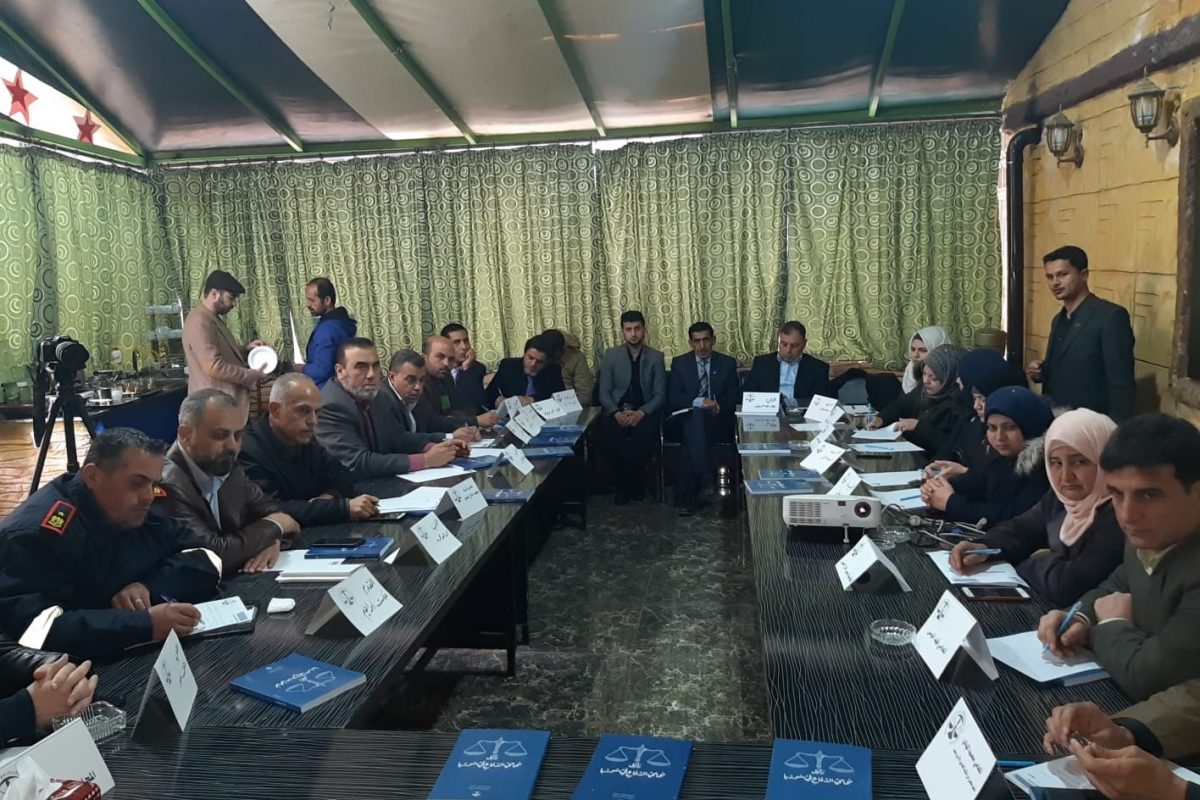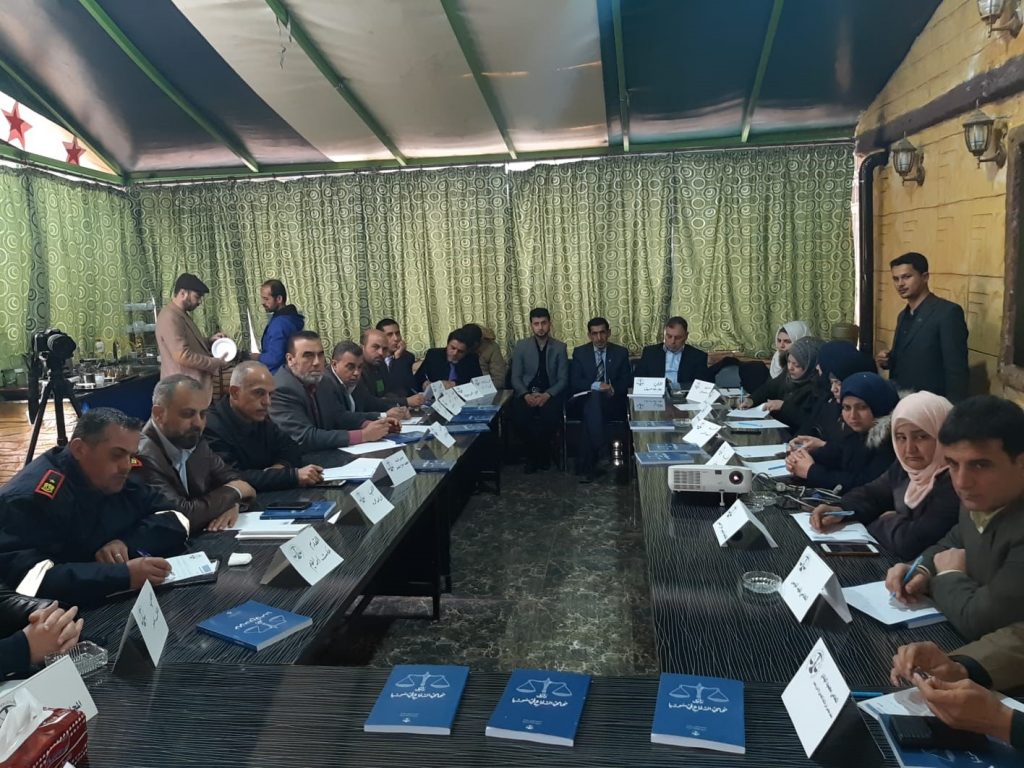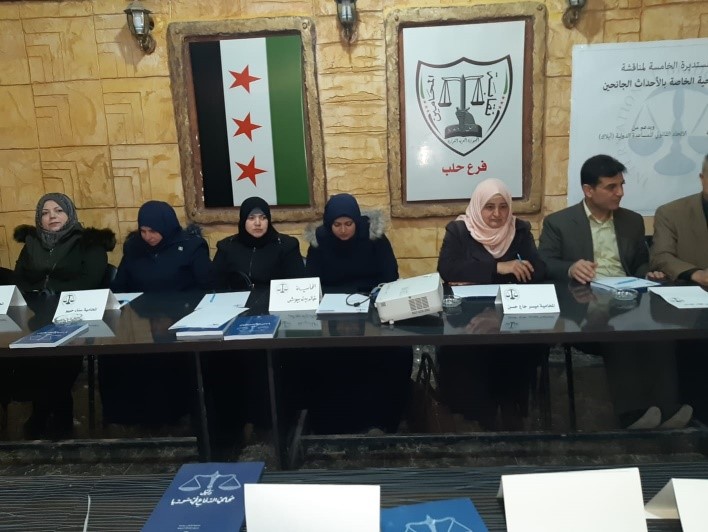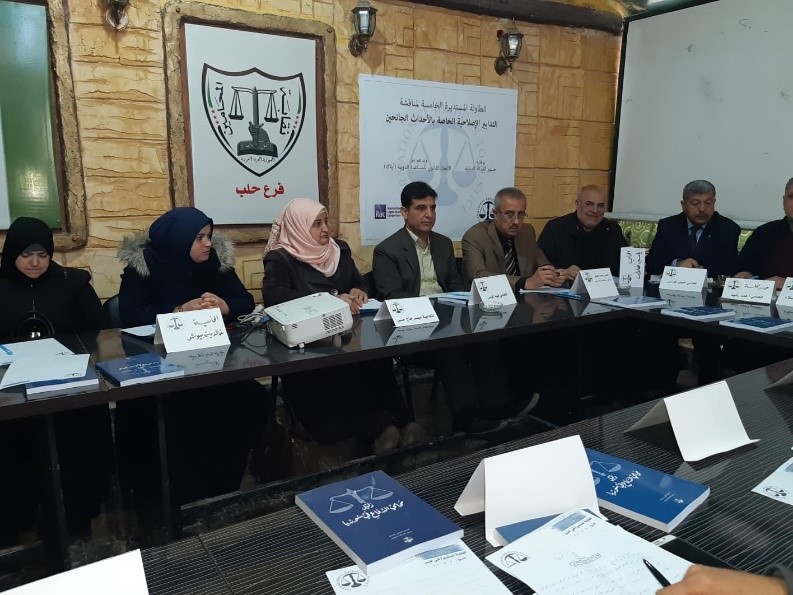
According to the Syrian law, when juveniles between the age of 10 and 18 commit a crime, they shall not be penalized the way adults are. Instead, they are rehabilitated. There is one exception to this rule – that is, when a juvenile, who is over 15, commits a felony, they receive mitigated sentences and rehabilitation at the same time. However, the circumstances in Syria gave way to violations of juvenile rights. For example, up until recently, juveniles were tried before adult courts. Moreover, there are no separate facilities for juveniles leading to juveniles being mixed with adults in the same prison. The intervention of IBJ lawyers over the past two years had led to a decline in children imprisonment. IBJ’s approach of early access to justice has further made it possible bail children and try them before a juvenile court. The judgments handed down, therefore, were commuted to small fines and other forms of correctional measures.
IBJ invited lawyers, judges, police officers, and the Minister of Justice to discuss this topic.

IBJ’s Field Coordinator, Hasan al-Mousa, initiated the event with a briefing on the past 4 roundtable events that IBJ held in Daret Azza, Maarat al-Numan, Afrin and Azaz where justice stakeholders discussed early access to justice, women and children’s rights, the suspension of the suspended sentences, and criminal matters resulting from HLP issues respectively. Hasan also laid out the outcomes of each event and how the stakeholders in the justice system made sure the outcomes are implemented.
Husein Bakri, IBJ’s Senior Legal Director, joined the discussion via Skype. He introduced the participants to the topic and laid out the importance of measures aimed at rehabilitating juvenile delinquents as the legal alternative to some of the current unlawful practices. Abdulaziz Darwish explained what rehabilitation measures mean as well as the objective of those measures. He mentioned how the war created a medium for violations against children including unlawful detention and displacement. Those circumstances led some minors to be delinquents. He further stressed the importance of early protection and safeguarding of juveniles by strengthening the work of school protection officers, getting dropouts back on track, as well as finding shelters for the homeless children and providing them with the care they need.

The Minister of Justice, Abdullah Abdulsalam, suggested that the juvenile courts should be rehabilitation institutions, and that separate sections in prisons should be allocated for juvenile delinquents. He underscored the importance of providing specialized psychosocial support to the juveniles in custody and noted that juveniles should not be liable for civil claims if they’re convicted as minors and then become adults in prison.
Jasem al-Ali talked laid out why some children become delinquents and highlighted their right to be tried as juveniles, not as adults. He also talked about the importance of founding juvenile correctional facilities that provide physical and psychological care for children noting that those facilities are meant to rehabilitate children not punish them.
Lt. Col. Hikmat Ibrahim underlined the need for specialized juvenile police that can investigate juvenile-related criminal matters. “Juveniles must not be detained without an arrest warrant, and the juvenile’s guardian must be properly informed”, he added. Yusuf Husein, said that juvenile detention facilities should be educational and correctional. Muhammad Haj Abdo further pointed out that a juvenile probation officer should be a specialist who base their report on facts and the meeting with the juvenile’s guardians to take into account the circumstances that led to the juvenile delinquency.

Ahmad Maznouq mentioned that juvenile hearings must not be public so that they don’t compromise the juvenile’s future. “We should replace the name ‘juvenile court’ with ‘juvenile committee’”, he suggested. Zahra Abu Hilal proposed delivering juvenile case management training and children rights awareness to legal practitioners, juvenile police, and to juvenile probation officers.
Outputs
Participants agreed on the following measures to improve juveniles’ access to justice and to ensure that children’s rights are protected:
- “Juvenile Committee” to be a replacement of “Juvenile Court”,
- Training PSS specialist to be better capable of providing juvenile delinquents with the social support they need,
- Assigning a case worker to every juvenile delinquent to provide PSS support,
- Providing case management and children’s rights training to legal professionals and police officers and court personnel who deal with juvenile delinquents,
- Follow a preventive approach by empowering the role of protection officers in schools,
- Getting dropouts to join schools and finding shelter to homeless children,
- Establishing rehabilitation facilities with qualified cadre and proper health care,
- Providing children in the camps with education and other forms of care,
- Forming a juvenile police force that includes female police,
- Coordinating with civil society organizations and bar associations to start initiatives to support children; and
- Empowering women to be able to lead the correction of juvenile delinquency
To follow up with the implementation of the aforementioned measures, the participants agreed to create a task force whose responsibility is to provide care for children and to ensure that juveniles’ due process rights are maintained. The task force will include people from bar associations, the judiciary, the police, schools, and civil society organizations, and will be managed and supervised by the Ministry of Justice of the Syrian Interim Government.
Media Coverage
This video shows Hasan al-Mousa welcoming the participants and giving a brief summary of the four past roundtable events held by IBJ inside Syria.
The event was also reported by the Syrian Interim Government, Aleppo Bar Association, and by Almohrar Network.